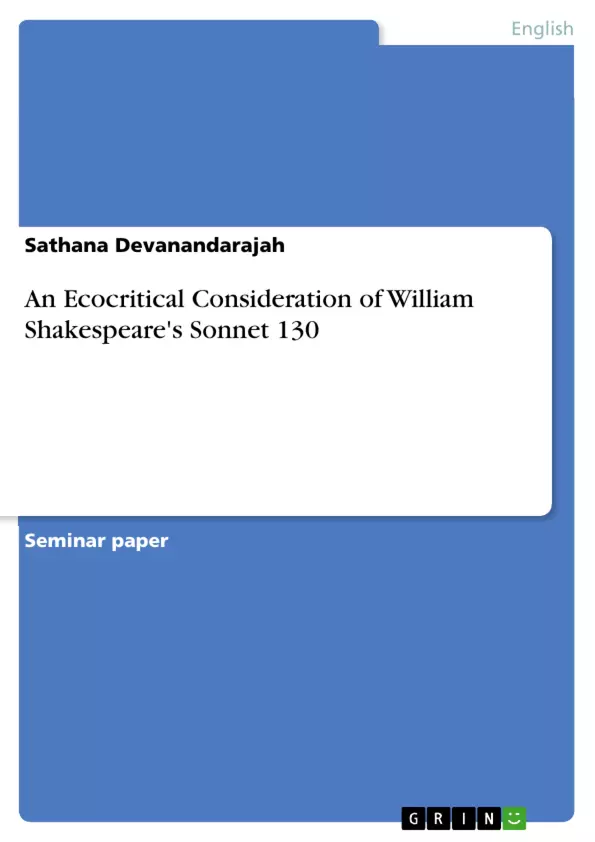This paper examines Sonnet 130 and some further remarkable sonnets from an ecocritical viewpoint putting special emphasis on how he represents the environment in order to gain an insight into Shakespeare’s perspective on Nature and to point out to what extent it is relevant for us.
One of Shakespeare’s most popular works among plenty of his plays, comedies and tragedies are his Sonnets. These 154 sonnets mainly focus on the themes of love, beauty and time. But if we examine these poems in more detail, we can notice that Shakespeare uses many words related to the semantic field of Nature in order to highlight its beauty and to compare it with human nature. Moreover, it plays an undeniable role in understanding the content of each sonnet in depth since he refers to different natural phenomena.
Table of Contents
- Introduction
- Ecocriticism
- Analysis of Shakespearean Sonnets
- Role of nature in Sonnet 130
- References to nature in further Shakespearean Sonnets
- Conclusion
Objectives and Key Themes
This essay explores the ecological dimensions of Shakespeare's sonnets from an ecocritical perspective. The analysis focuses on Sonnet 130 and other notable sonnets, investigating Shakespeare's representation of the environment and his insights into the relationship between humanity and nature.
- The significance of nature in Shakespearean sonnets
- Ecocritical analysis of Shakespeare's works
- The relationship between humans and the environment in the Elizabethan era
- The importance of preserving natural resources
- Shakespeare's perspective on the natural world and its relevance to contemporary concerns
Chapter Summaries
The introduction establishes the context and purpose of the essay, highlighting Shakespeare's use of nature imagery in his sonnets and the rationale for applying an ecocritical lens. Chapter 2 provides a comprehensive overview of ecocriticism, outlining its origins, key principles, and analytical approach to literary texts. The chapter delves into the theory's potential to re-examine literary works through an environmental perspective, emphasizing the importance of understanding and protecting the natural world.
Chapter 3 focuses on the analysis of Shakespearean sonnets, specifically exploring the role of nature in Sonnet 130. The analysis examines the sonnet's themes and imagery, drawing connections between the natural world and human experiences.
Keywords
The core concepts of this essay revolve around ecocriticism, Shakespearean sonnets, nature imagery, environmental perspectives, the Elizabethan World Picture, and the relationship between humanity and the natural world. It examines the interconnectedness of these themes through an ecocritical lens, highlighting Shakespeare's engagement with ecological issues and their enduring relevance.
- Quote paper
- Sathana Devanandarajah (Author), 2020, An Ecocritical Consideration of William Shakespeare's Sonnet 130, Munich, GRIN Verlag, https://www.grin.com/document/1036006



